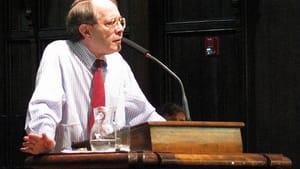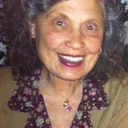Stay in the Loop
BSR publishes on a weekly schedule, with an email newsletter every Wednesday and Thursday morning. There’s no paywall, and subscribing is always free.
Tackling the memoir
Jonathan Kozol's 'The Theft of Memory'

Quite some time ago, I consulted with a doctor of Ayurveda. After an unhurried conversation, during which he used unconventional diagnostic tools (including observation of body movement, fingernails, hair, and tongue), the doctor arrived at recommendations concerning diet, herbs, massage therapy, and lifestyle. Then he said, “And in a few years you can retire and write your memoirs!” I accepted his words as affirmation of a prospect I’d already had the whimsy to consider.
Post-retirement, I’m well into writing a memoir about the last week of my father’s life. Thus I was inspired to attend a Free Library talk by Jonathan Kozol, author of a new memoir about the death of his father. I’ve known of Jonathan Kozol since the late 1960s, when he emerged as a writer, educator, and activist. He showed up onstage in a lightweight spring suit and flower-print tie, atop black sneakers with white laces, immediately removing the suit jacket and rolling up the sleeves of his button-down blue shirt, and I thought: Rolling up the sleeves epitomizes his lifelong advocacy for social justice.
Entitled The Theft of Memory: Losing My Father, One Day at a Time, Kozol’s memoir details the descent of Harry Kozol, M.D. into Alzheimer’s disease. A neurologist and psychiatrist for 60 years, Dr. Kozol helped establish the field of neuropsychiatry. He was, according to his son, an old-fashioned doctor who carried a black doctor’s bag and expressed interest in the lives as well as the symptoms of his patients. Even as he succumbed to mental debilitation, Harry continued to exhibit “clinical curiosity about his own bewilderment.” The doctor in him wanted to uncover the causes of the patient’s descent.
Kozol said he began taking notes when his father initially showed signs of becoming confused, and continued note-taking over the 14 years of his father’s illness. In the year after his father died, he recorded all the details of his father’s life he could remember. Then, he put the record aside. A few years later — when he himself was past the age of 75 — Kozol aimed to write the story “before the memories were all forgotten.”
A long day’s journey for Eugene O’Neill
My favorite and the sweetest of Kozol’s disclosures was that his father had been physician to America’s only Nobel Laureate playwright, Eugene O’Neill, in the last years of O’Neill’s haunted life. They met in Boston, where O’Neill was seeking medical help. O’Neill was by then suffering from a Parkinson's-like disease that caused such convulsive tremors in his hands that he could no longer write. And there was depression. O’Neill liked Dr. Kozol, moving from the West Coast into a hotel room across the street from the latter’s Boston office. The doctor visited him almost every evening, and they would chat and joke together until O’Neill felt relieved enough of agony to be able to sleep. The doctor developed a personal attachment to O’Neill, becoming his bedside companion and psychologist in addition to neurologist.
Kozol was the pronouncing physician at O’Neill’s bedside when he died. Though Kozol fils didn’t mention it, O’Neill’s last words, reportedly whispered, were: "I knew it. I knew it. Born in a hotel room and died in a hotel room." From his autobiographical masterpiece, Long Day’s Journey into Night, we know about O’Neill and hotel rooms; that due to his father’s profession as touring actor, he was in and out of them from birth until boarding school.
O’Neill told Harry Kozol that he’d had two choices to deal with the “sense of guilt about what was imprisoned within me and wanting to come out”: He could drink, or he could write. History suggests that O’Neill chose both, though there came a time when he could no longer drink. With the end of drinking, he wrote his greatest plays, the autobiographical last three; after which, there came a time when he could no longer write.
Long Day’s Journey into Night is O’Neill’s instead-of-a-memoir play. According to the dedication, O’Neill wrote this vision of family sorrow, “in tears and blood, . . .with deep pity and understanding and forgiveness" for his father, his mother, his brother, and himself. Somewhere I heard that O’Neill bled through the pores of his skin when holed up in his study writing the play.
The sweetness of memory
In contrast, for Kozol, summoning up vivid memories was mostly a pleasant process. It kept his father, as well as his mother, alive for him after their deaths. But the last few months of concluding the book were hard and painful, he said, because it meant saying good-bye to his parents all over again. Ultimately, watching the aging of his mother and writing the death of his father forced him “to contemplate changes attendant upon the last years of our lives.”
If the memoirist is able to cast an honest eye, memoir writing invariably brings tears and disturbances of the blood. The task is incompatible with suppression of feelings. I’ve found it to be a process of excavation, evoking disappointment, regret, and grief, as well as self- and other-incrimination. The beauty is that the memoirist has the space to feel the feelings attached to incidents from the past, maybe for the first time. The memoirist has opportunity not to push the feelings away and not to act them out, but to become familiar with them, letting them be, and eventually letting them go — into the work. As O’Neill testified, when the past gets unburied, “deep pity and understanding and forgiveness” may arise.
No wonder that a merciful doctor of Ayurveda recommend writing my memoirs — he could see its potential as a form of healing. In Kozol’s mind, it’s a form of benediction. Memoir writing, he intimated, allows “the essence of the blessings our parents give us to outlive the death of memory.”
Sign up for our newsletter
All of the week's new articles, all in one place. Sign up for the free weekly BSR newsletters, and don't miss a conversation.

 Joanna Rotté
Joanna Rotté